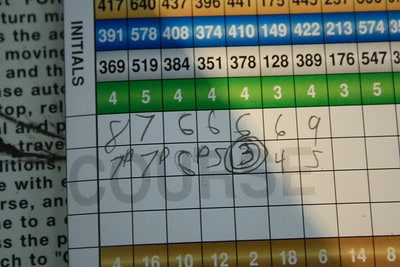What is a golf handicap for a beginner? 1 Great Way To Power Your Game
When venturing into the world of golf, beginners encounter a wide range of complex terminologies, rules, and scoring systems that may seem overwhelming at first. One such term is the handicap. What is a golf handicap for a beginner? It’s an essential component of the game that ensures fairness and competitiveness among players of differing skill levels.
In this article, we will delve into the concept, explain what a golf handicap for a beginner is, how it is calculated, and outline what constitutes a respectable handicap for a starting player.
Related: The Ultimate Beginners Guide To Golf
Understanding the Golf Handicap for Beginners
What is a Golf Handicap For A Beginner?
A golf handicap is a numerical measure that represents a player’s potential skill level in relation to a scratch golfer (someone who plays at the course’s rated difficulty). It allows golfers of different abilities to compete fairly by adjusting their scores according to their respective handicaps. In simpler terms, a handicap is an allowance given to level the playing field for individuals of various skill levels.
How is a Golf Handicap Calculated?
To calculate a handicap, various performance factors are taken into consideration: the player’s past scores, course difficulty, and the rating of the course played. Most handicap systems follow the World Handicap System (WHS) guidelines, ensuring consistency across different golf associations and clubs.
The modern handicap calculation involves taking a player’s best scores from recent rounds (typically the lowest 8 out of the last 20) and applying a formula that takes into account the course rating and slope, which reflect the course’s difficulty. The exact calculation may vary slightly depending on the handicap system in use, but the underlying principle remains the same: to provide a fair reflection of a player’s ability.
What is Considered a Decent Handicap for a Beginner?
For novice golfers, achieving a handicap is a gradual process that comes with practice and experience. While it is difficult to determine a specific benchmark for a “decent” handicap, it is generally expected that beginners will have higher handicap values. Golfers typically start with a handicap of 36 or higher, with higher numbers indicating a lesser level of skill. As players improve and garner more experience, their handicap tends to decrease, indicating progress in their abilities.
It’s important to understand that a handicap is not a reflection of talent but rather a measurement of potential skill level compared to a scratch golfer. As beginners continue to develop their game and gain familiarity with various aspects of golf, their handicaps will gradually decrease and approach the lower end of the scale.
Conclusion
A golf handicap is a crucial component of fair play and competitiveness among golfers. Its purpose lies in leveling the playing field by allowing players of varying abilities to compete on an equal footing. For beginners, a golf handicap serves as a tool to measure their potential skill level and track their progress over time. Starting with higher handicap values, beginners can gradually aim for a lower handicap as they gain experience and improve their game. Embracing the journey and maintaining a positive attitude towards the game will ultimately lead to a rewarding golfing experience for all levels of players.
Remember, it’s not about achieving a specific handicap—it’s about continuously honing your skills, embracing challenges, and enjoying the beauty of the game. So, grab your clubs, hit the course, and embrace the world of golf with enthusiasm and determination!
Top Questions
What is a golf handicap for a beginner?
A handicap in golf is a numerical measure of a golfer’s playing ability. It represents the number of strokes a player is expected to take above or below the course rating.
How is a golf handicap calculated?
Handicaps are calculated based on a golfer’s scores from previous rounds. The formula takes into account the course rating, slope rating, and other factors to determine an adjusted score known as the handicap differential.
Why is having a handicap important in golf?
Handicaps allow golfers of different skill levels to compete fairly against each other. They level the playing field by adjusting the number of strokes a player receives, allowing for more enjoyable and equitable competition.
What is the maximum allowable golf handicap?
In most golf associations, the maximum handicap a golfer can have is 36.4 for men and 40.4 for women.
How can I obtain a golf handicap?
To obtain a golf handicap, you usually need to join a recognized golf association or club. They will provide you with a handicap index by taking into account your scores from designated rounds of golf.
Can I have a handicap if I’m a beginner or new to golf?
Yes, even beginners can have a golf handicap. By submitting scores from rounds played, your handicap will gradually be established based on your performance.
Does my handicap change over time?
Yes, your handicap can change over time based on your recent scores. It is typically recalculated periodically to reflect your current playing ability. The frequency of updates may vary depending on the handicap system being used.
Can I use my handicap on different golf courses?
Yes, your handicap can be adjusted based on the difficulty of the course you are playing. This adjustment is made using the course rating and slope rating, which reflect the layout and difficulty of the specific course.
Do professionals have handicaps?
Professional golfers typically do not maintain handicaps as they compete in tournaments with different rules. Handicaps are primarily used in amateur and recreational play.
How can I improve my golf handicap?
Improving your golf handicap involves consistent practice, refining your technique, and gaining experience on the course. Working with a golf instructor, playing regularly, and focusing on specific areas of your game can help you lower your handicap over time.
Remember that golf handicap rules and regulations may slightly vary across different golf associations. It is always important to familiarize yourself with the specific guidelines of the organization you are affiliated with.
Bookshelf
- Think Better, Play Smarter, and Manage Your Way to Better Golf Scores: Ten creative strategies and methods that can help put you in the exclusive fraternity of golfers with a single-digit handicap


